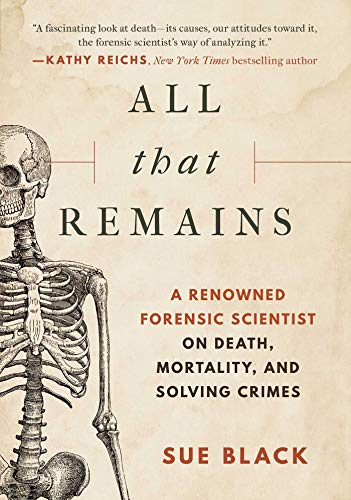
Life is pleasant. Death is peaceful, It’s the transition that’s troublesome.
–Isaac Asimov
All that Remains, by Sue Black, is an absorbing memoir on death, mortality, and solving crimes, a renowned forensic scientist. Among her many accomplishments, she has served as Director of the Centre for Anatomy and Human Identification at the University of Dundee, Scotland.
Black’s experience working in a butcher shop as a school girl in Inverness, Scotland, piqued her interest in how bodies work. She shares her early college experiences and how she learned the priceless lesson that there is much the living can learn from the dead. The author is an enthusiastic proponent of people donating their bodies after death so that others may learn.
The author has used her forensic expertise in solving high-profile crimes as well as identifying bodies of missing people. She was the lead forensic anthropologist for the British team’s work in the 1999 war crimes investigations in Kosovo, helping to organize and identify bodies buried in mass graves. She goes into some detail about the terrible acts against humanity in this horrific conflict. The author also worked in Thailand after the 2004 Indian Ocean tsunami. She has appeared in court, giving testimony about the scientific facts surrounding crimes, and also speaks on radio and television about her experience as a forensic scientist. Black shares these experiences in honest detail, acknowledging that not everyone can tolerate this information, but insisting that knowledge allows people to come to grips with the deaths of their loved ones, especially those who have been missing for a period of time.
I strongly recommend All that Remains. It’s an informative account of life and death written not only by someone who has enormous experience, but one who has compassion and understanding. The author shows her gentle humor when working in the field, often being the only woman on a team, of dealing with extreme heat, or freezing cold. She is adept in making scientific data understandable to the layman. Not everyone is comfortable with this subject, but I appreciated Black’s unapologetic look at death and immortality, and how knowledge of death can help us accept the inevitable.


This got off to a slow start for me, but I’m so glad I kept at it, because I loved this book! Absolutely fascinating. I’m an organ donor, and have been trying to decide whether I want to be a body donor. I’ll probably stick to organ donation for now, but if I get really old and my organs aren’t useful, I may switch. Sue Black seems like an amazing person and I’m going to check out some of her online lectures. Death is a fact of life, and the more we are able to talk about it and learn about it, the more we can focus on living instead of living in fear of death.
I was fascinated too, Karen. My sister-in-law is a nurse and I recommended it to her and she loved this book. I, too, am an organ donor and have been considering the “whole body.” Thank you for your interesting comment.
Wow, Mary! This sounds like an outstanding read. I can imagine what she’s seen, learned, and taught. What a remarkable story. Thanks for sharing.
Thanks, Carmen. I think most people would find this fascinating. It isn’t gruesome at all, but not everyone would appreciate the topic.